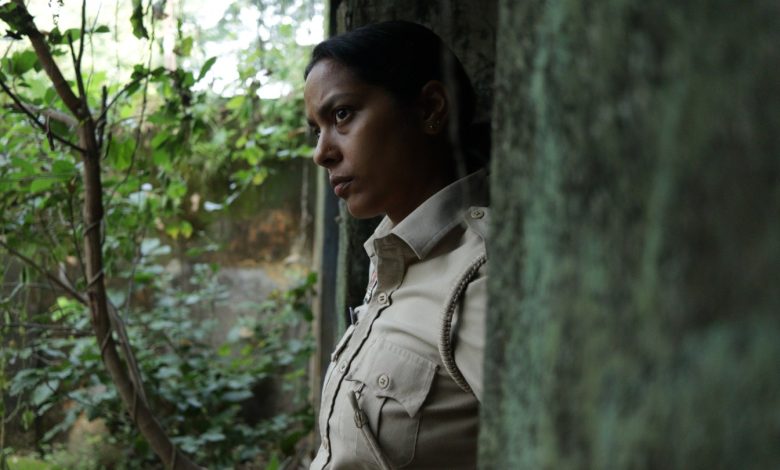‘Santosh’ Director Sandhya Suri Interview About UK Oscars Pick

[The following story contains spoilers from Santosh.]
Sandhya Suri’s Santosh won two British Independent Film Awards on Sunday.
Not only were Balthazar de Ganay and James Bowsher honored in the breakthrough producer category, but Suri also took home the best screenplay award for her feature film debut.
The British-Indian director’s background is firmly in documentaries and Santosh, in its very early stages, was going to be just that: a forensic look at the rife violence against women in India, the deeply embedded corruption within its police force and the powerless women forced to watch on.
“I couldn’t figure out how to do it as a documentary form because it was just too horrific,” Suri tells The Hollywood Reporter about the U.K.’s Oscars submission for best international feature. “I dropped the project.”
But it was the brutal and shocking case of 23-year-old Jyoti Singh, who was gang raped by the driver of the bus she was traveling on and five accomplices in Delhi in 2012, that changed everything for Suri. The “Nirbhaya” case (meaning the “fearless one”), as it was dubbed in the media, provided the filmmaker with an entirely different angle to approach her film from: the female police officers caught between country and community.
Santosh stars Shahana Goswami in the titular role, a young Hindu widow who inherits her husband’s job as a police constable thanks to a government scheme. She finds herself caught up in institutional corruption even as she is taken under the wing of a rough-edged veteran detective, Inspector Geeta Sharma (Sunita Rajwar), on a murder case involving a teenage girl from the lower caste Dalit community.
With a theatrical release in the U.K. set for Mar. 21, 2025, Suri talked to THR about the single image of a Delhi protest that inspired the movie, her Oscar hopes after being tapped to represent Britain and the slightly “Bollywood” ending, which encompasses exactly what this story represents: “It’s about another way to be a woman.”
Congratulations are in order, Sandhya! How were the BIFAs for you?
It was really lovely. Because I feel that people are slowly starting to watch the film. It’s not been a fast one coming out of the door. But slowly — slowly — I’m feeling now people are watching it and talking about it a little bit more. And those who watch it are giving me very lovely feedback.
Well, Santosh isn’t just any film — this is the U.K.’s best international feature film pick for the Oscars.
It’s great, right? [That award was previously given to the] best film not in the English language. But there’s something for me that means a lot about having this system of policing [in the film], which is residual from British rule. To have that represented in the story feels British in a weird way. So I feel very, very proud. India’s rooting [for us], England’s rooting. I’m feeling quite doubly supported. They’ve adopted me in India as well.
Santosh director Sandhya Suri.
Tell me about how Santosh came to be. She’s amazing. Such a silently forceful protagonist.
Well, I’ve come from documentaries. I was in India, in the Hindu belt, with various NGOs. I was trying to make a doc about violence against women. If you know India well, it’s something that … you know, I wanted to grapple with, but I couldn’t figure out how to do it as a documentary form because it was just too horrific. I was just looking at it, and my objective was to try to get inside it somehow: the violence. Explore it, bring some understanding to it. So I realized that that wasn’t going to work in the way I was approaching it. I dropped the project.
Then, in 2012, we had this horrific gang rape [of Jyoti Singh] on the bus, the Nirbhaya case. I saw a photograph which really struck me which was female protesters, absolutely enraged and spitting with hatred. And they’re facing this Constable, a female Constable. Her visor was half down, but what was left of her face that I could see was so enigmatic, the expression. I was hooked. I’m like, “Oh, my God, that’s how I tell the story.” I tell it through her. I tell it through her because she’s both things. She’s a perpetrator, she’s a victim, she experiences their power, but she’s also powerless. Then I started investigating female cops and found out about this ‘appointment on compassionate ground’ [a job given to an immediate family member of a government employee who died while in service]. I thought, that’s definitely a story to watch: a wife becomes a widow and then becomes a police woman in one of the most corrupt forces in the country. Then I just had to figure out how to write a fiction and make a genre film. And then I just had to make a film.
I also had no idea compassionate appointments existed. We witness an incredibly transformative journey for her. Where did you want that to end, compared to the character we meet at the beginning?
I think that what was important for me was, we talk about corruption a lot in cinema and police worlds, not just in India, but everywhere. And what I knew was I didn’t want to make a film about the good cop in the bad system. I wasn’t interested in that. I was interested in a very morally murky universe. That’s what felt truthful, and Santosh trying to find her own grey within that. So what is her grey? [That] was my question. And also the other question was, if she does cross the line, is there a way to come back? And at the end of the film, [Geeta] sort of says, “Look, there’s two ways to be a woman. You can be like me, or you can go and be that trapped bird in the household with nothing.”
Even though the film is a dark film, on many levels, I do believe there’s something positive for me also, in the end where Santosh, says, “You know what? There must be a third way. And I don’t know exactly what that is, but I’m going to catch a train to Mumbai.” It’s a bit Bollywood, right? But I’m going to find that third way. It’s about another way to be a woman, which is not either of those things.
I was blown away by their performances. That last conversation with Geeta, where she effectively says if an innocent man has to die for women to be safe, she’s willing to be responsible for that. When it comes to provoking change, where does the responsibility lie?
Well, I find that conversation very interesting from Geeta, because it’s the only time in the film where she gets to present herself, right? We don’t know her at all, but ultimately, I feel like she’s unknowable even post that dialogue. She has this psycho-feminism, which is utterly outrageous in everything she’s saying, but given the context of the film, also makes sense in some horrific way. And I found that interesting. Listening to that discourse, you’re not just like, “Oh, she’s nuts, right?” She sort of is, but also I can understand why she might have developed this rhetoric.
But [there is] another question on top of that, which is: Does she believe her own rhetoric? She does. I think she does care deeply for women at some level. And there is something also in terms of what Santosh does in the film. Obviously, when women listen to the violence and hear about violence perpetrated on women every day, one is filled with rage. It does sit very deeply. And what do we do with that anger? So yeah, [Geeta] has brewed something and come up with this, which I find interesting. But there is also this sacrifice for Santosh, which gives her a deep humanity.
Sunita Rajwar (left) as Geeta Sharma in Santosh.
You’re totally right. There is this enigmatic, unknowable quality to Geeta. And we see that through Santosh’s eyes. These themes are so apt, of course, but what are you trying to evoke from the audience member?
It’s tricky. Obviously, it’s not just [about] violence against women. That’s a starting point. There are many things that are within that fabric of the film: the Islamophobia, the caste-ism, corruption, the casual violence. There’s a tapestry in the DNA of this place, where she is. And for me, it was more about holding some sort of mirror up and saying, you know, all of these things can exist so casually and so banally somehow. What do we, as an audience, feel about that in India? Also, where do we sit in all of those fault lines which traverse society? Shahana, who plays Santosh, said that she did. She felt, personally, as an Indian living in India, that it does hold up a mirror. And it’s not so much the finger pointing, but it holds up more of a mirror and asks you to question where you sit on all these things.
Did you shoot the entire film in India?
Yeah.
How long was the shoot?
Fourty-four days.
Oh, wow.
It’s a big film. I mean, there’s a lot going on. We’ve got like, 76 speaking parts. Some things got cut, but there were stunts and crowd scenes. It’s a first feature. So they were very kind to give me enough time to do the things that are difficult, like shooting in all these live locations and committing to that. So it took a little time.
I mean, it’s a testament to the faith that they had in you. Following your BIFA win and with the Oscars on the horizon, what are your hopes now that we’re firmly in awards season?
It’s firmly rooted in Hinduism, this idea that you don’t influence the outcome of the work, right? You do your work with your best ability, and then the universe handles the rest. It is tiring, but I am enjoying engaging with very many different audiences around the world. I do think the film is talking about a lot of things that are important in a way that I hope is engaging. I just want it to reach its audiences in many places, to have a healthy distribution in the U.K., to have people come and see it for that release in India; we have a distributor now. I just hope that the awards help bring the film to the to its audiences, because that’s why I’ve made it.
We had a fantastic run in Paris, in France. We opened above Twisters. We didn’t hold above Twisters. (Laughs.) But we opened above Twisters. We had a brilliant run. And France is a country that doesn’t have the same relationship to India that Britain does. It took so much longer to get distribution here and and secure that. So I just pray for a good cinema culture in the [U.K.]. We have faith in audiences. This is a genre film. It’s not boring. It just happens to be in Hindi. And I think what’s been amazing from showing it in so many different countries now — Japan, Poland, wherever — it is feeling very universal, and audiences are connecting.
Source: Hollywoodreporter
Related Posts
- Roundball Rocked: With NBA Return Looming, NBC Purges Scripted Roster
- SoundCloud Says It “Has Never Used Artist Content to Train AI Models” After Backlash on Terms of Service Change
- Fox News’ Camryn Kinsey Is “Doing Well” After Fainting on Live TV
- Kerry Washington and Jahleel Kamera in 'Shadow Force.'
Courtesy of Lionsgate
…
- This Alternative Artist Landed a Top-20 Chart Debut With an Album Made Almost Entirely on His Phone





